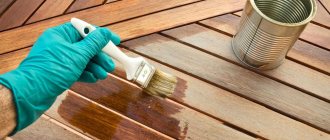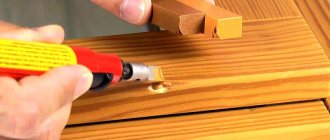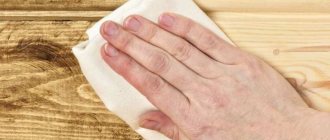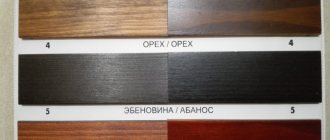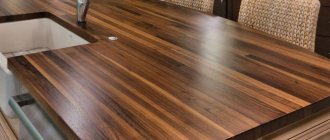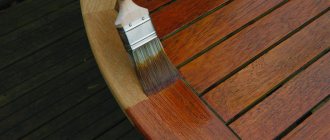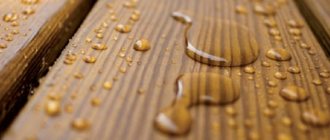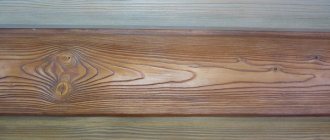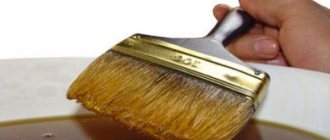26.02.2021
Wood is an excellent building and structural material. It is easy to process, has natural beauty, is “warm” and “breathes”, quite strong and durable.
Despite the spread of artificial analogues, natural material has not lost its importance. Houses, bathhouses, and outbuildings are built from wood. It is used in interior and exterior decoration. Wooden structures, such as stairs or furniture, are highly valued. This popularity is explained, among other things, by the presence of effective means of protecting wood - so-called impregnations.
Does wood need impregnation?
Like any organic material, wood is vulnerable to fungi, bacteria and mold, and is also defenseless against insects and rodents. Under the influence of atmospheric factors, the tree is deformed and prematurely destroyed. Therefore, the material needs special protection from negative influences.
Why do you need protective impregnation:
- Creates a layer on the surface of the wood that does not allow moisture to penetrate the fiber structure.
- Prevents swelling, deformation, cracking and destruction of solid wood.
- Prevents the creation of conditions favorable for the development of fungus, bacteria and mold.
- Repels insects and other pests.
- Provides an attractive appearance of the material.
The best impregnations emphasize the decorative advantages of wood and allow the wood to “breathe” - that is, allow air to pass through. Full natural air exchange is very important for the free removal of moisture and maintaining a healthy microclimate in the house.
A tree not treated with protection quickly loses its attractive appearance. It changes color under the influence of moisture and ultraviolet radiation, can change shape, traces of fungus and mold development appear on its surface, cracks and other damage form. In unfavorable conditions, wood begins to rot. This is why it is so important to use high-quality protective impregnations.
The old fashioned way: edible flaxseed oil from the store
Many crafters use a homemade mixture of raw linseed oil, beeswax and rosin. What could be more environmentally friendly? Indeed, if we mix all these ingredients and heat them up, we get a simple oil-wax mixture made from natural ingredients. But it’s a stretch to call such a coating harmless to health. The thing is that edible (raw) flaxseed oil, which we are used to seasoning salads with, is healthy only when fresh from the refrigerator. This oil should be stored with the lid tightly closed, excluding air access. The peculiarity of linseed oil is its very rapid ability to oxidize under the influence of oxygen. As a result of oxidation, many free radicals are formed in the oil, which have an extremely negative effect on the entire body. Add to all this the inability of edible flaxseed oil to polymerize (completely dry/harden) and we get an “excellent” cocktail of carcinogens that will enter your body the first time you eat food from dishes or cutting boards treated in this way. It is the inability of the oil to harden inside the wood to form a solid polymer that causes it to enter the body with each use. In general, this is exactly the case when you don’t need to save on your own health and the health of your loved ones. Treating wooden utensils and cutting boards with edible linseed oil is hazardous to health.
Types of impregnations by composition
In terms of composition, impregnations based on water, oil and chemical (when the main active ingredient is a solvent) differ.
- Water-based impregnations
are the most affordable and easiest to use. They are absorbed deeply into the structure of the array, but have a weak protective effect and are very short-lived. - Oil products
are much more effective. Oils and waxes are traditionally used to protect wood from moisture. They create a reliable shell that allows the material to “breathe”. - Solvent-based preparations are
usually toxic. They effectively neutralize the effects of fungus and bacteria, but pose a health hazard, so they are not used indoors.
Of greatest interest are natural-based impregnations with modifying additives without the inclusion of toxic substances. We recommend using products from the Canadian company Decken, which has developed a line of effective wood protection products with natural oils and waxes.
Content:
- Wood oil BELINKA
- Wood oil for interior work
- Linseed oil for wood Kraskovar Wood Oil Protect 0.75l
- Woodworking oil
- Traditional wood oil
- Wood oil with hard wax. Decor Premium
- Wood oil with hard wax for stairs and floors Sigma Extra
- Wood oil Pinotex WOOD&TERRACE OIL colorless 1 l.
- Wood oil GOODHIM, 2.2l
- Teak Oil BORMA WACHS (Borma)
Types of impregnations by purpose
In terms of functionality, there are impregnations:
- Antiseptic - prevent the development of microorganisms (fungi, mold, bacteria). It is antiseptics that protect wood from blue stains, rot and damage by insects.
- Water-repellent - do not allow moisture to penetrate deep into the material and, thereby, prevent its deformation. Most often they also have an antiseptic effect.
- Fire-resistant - for a long time prevent the ignition of wood under the influence of fire. The effect is achieved due to the presence of fire retardants in the composition.
- Frost-resistant - increases the resistance of wood to sub-zero temperatures.
- Decorative - emphasize the unique wood texture, and also give the wood the desired shade.
The best Decken impregnations combine antiseptic, water-repellent and decorative functions.
Advantages of oil as an impregnation
It is impregnations based on natural oils and waxes that best protect wood from water, fungi and rot. They form a breathable coating on the surface of the wood that does not allow water to pass through and prevents the development of microorganisms. At the same time, moisture is also not retained inside the material, freely leaving along with the air. This ensures healthy indoor conditions.
High-quality oil impregnations contain vegetable oils. This natural base is safe for humans, so the protection can be used both outside and indoors. Additionally, it may contain modifying components that increase the moisture-, dirt-repellent and antiseptic properties of the oil, and also prevent the formation of a film effect and extend the life of the protection.
The main advantages of oils as impregnations:
- Reliably protect wood from water, microorganisms, and pests.
- Do not interfere with air exchange.
- They have a natural base, are safe, non-toxic.
- Easy to apply.
- They effectively highlight the natural wood grain.
- They create a durable protective layer that does not deform during use.
- They are quickly renewed at the end of their service life without the need to remove residual old oil.
- Unlike paint, they do not peel off or come off surfaces.
Protective oils are universal - you can choose the appropriate composition for interior and exterior work, for walls and ceilings, floors and stairs, furniture, as well as for rooms with high temperatures and humidity.
Review of manufacturers
The construction market offers a wide range of oils suitable for processing materials. For home processing, we can highlight: Borma Wachs, OSMO, Adler, American Wood Oil, Varathane, Tikkurila. For external ones, the following brands can be noted: Belinka, Tikkurila, Borma Wachs, OSMO.
The construction market offers a wide range of oils suitable for processing materials.
Selecting oil according to application
All high-quality wood oils have a natural plant base, but differ in the set of modifying additives that determine the scope and purpose of a particular impregnation. When choosing a wood protective treatment, it is important to consider the composition and manufacturer’s recommendations for application and use of the material. Only in this case can you count on the effectiveness of the protection.
Interior oil
The basis of the Decken product range is oils intended for internal use. Such compositions are not designed for use in outdoor conditions, since they do not have weather-resistant properties. But indoors they provide maximum protection for the tree.
Oils for interior work are most often used to impregnate wooden walls and ceilings, doors, baseboards, beams and other structural elements of the building. Such protection is suitable not only for solid wood, but also for laminated wood, cork and chipboard.
Oils for floors and stairs
Decken oils intended for floors and stairs deserve special attention. These are materials that, among other things, strengthen wooden surfaces - making them more resistant to abrasion. The best formulations prevent the formation of stains - including from dark drinks (such as wine or tea), which pose the greatest danger to the flawless appearance of the wood.
Furniture oil
Decken natural oil for interior work is also recommended for painting wooden furniture. A safe plant-based protective composition is ideal for treating cabinets and chests of drawers, tables, wooden parts of sofas, armchairs, and chairs. After treatment, the surface becomes pleasant to the touch, the oil successfully highlights the advantages of the wood grain.
You can see the price of oil and buy it here
Exterior oil
Protective materials intended for external use contain additives that provide weather-resistant qualities. Such oils withstand changes in humidity and temperature, weathering, precipitation and ultraviolet radiation. Wooden surfaces treated with them do not crack or deform under the influence of the external environment.
Decken brand outdoor oils are also made from natural plant materials and are completely safe for people and animals. They are used to treat doors and windows on the street side, fences, balconies, pergolas, awnings and various structures in the garden.
The Canadian manufacturer’s product range includes, among other things, specialized solutions for facades and terraces:
- Facade oil protects wooden material from ultraviolet radiation, ensures color preservation, and protects against grayness. The coating is highly durable and can repel dirt. You can choose a color composition to give the facade a certain shade.
- Terrace oil is intended for surfaces with increased operational load. The resulting coating is more durable and wear-resistant.
Bath and sauna oil
Wooden surfaces, structures and objects operated in conditions of high humidity and temperature changes require special protection. In a traditional steam room and sauna, the likelihood of the formation and development of fungus and mold is much higher. To protect the tree from premature deterioration, it should be treated with special oil.
The Decken line includes a specialized solution for baths with increased heat resistance and pronounced water-repellent properties. It is based on natural wax, creates a breathable coating, emphasizes the wood texture and does not affect the natural wood aroma.
Canadian-developed heat-resistant wax creates a wear-resistant coating that lasts for a long time.
You can see the price of oil and buy it here
How to choose the right wood impregnation?
When choosing a wood impregnation (be it oil or any other product), it is important to understand exactly where it will be used and under what conditions it will be used.
First of all, you need to decide for what work the material is intended.
- for internal or external. The choice of composition of the product depends on this, because toxic products can be used on the street (although it is advisable, if possible, to use safe protective equipment). In addition, for outdoor use you need to choose an impregnation with weather-resistant properties.
Secondly, you should pay attention to the nature of the operation of the surface being treated
. For flooring and all horizontal surfaces that people walk on (steps, terraces), it is better to choose materials with increased wear resistance. For most vertical surfaces this criterion is less significant.
It is difficult to make a mistake in choosing, because manufacturers, as a rule, indicate the purpose and scope of application of the product. All you have to do is follow their recommendations.
Additional factors for choosing impregnation:
- Decorative properties
- many products slightly change the shade of wood, and some contain a coloring pigment. - Durability of protection
- while water-based impregnations last only a short time, Decken oils protect wood for 3-4 years. - Cost
– Price is important when comparing different products with the same features. - Product consumption
- you should always compare the cost and consumption of products, which vary significantly. - Method of application
- you need to select a product that can be applied without significant effort and expense.
How to remove small scratches from oiled furniture?
An excellent method for removing small surface scratches is to gently (very gently) sand the damaged area with fine-grit sandpaper (180-240 grit). And cover it locally with a new layer of oil. Oil should be applied along the natural lines of the wood pattern. Systematic maintenance allows you to eliminate most of the damage caused during use.
A wide range of oil-based wood stains are available from gardening and home improvement stores and are available in a variety of sizes. Most often, the package contains a specification regarding the characteristics of the product. Before purchasing, you should also pay attention to the possibility of using the product indoors or outdoors.
Features of applying oils
Any protective oils are applied to the base, the temperature of which exceeds 10 degrees Celsius. It is recommended to pre-clean and sand the wooden surface to be treated. This allows the composition to be evenly distributed over the surface and also reduces material consumption. Oils for internal use are applied only to a dry surface.
The composition is applied in a thin layer along the wood fibers - using a brush or rag. The excess is removed, after which the layer is left to dry for 15-30 minutes. To achieve the best result, the procedure is repeated. It takes up to 12 hours for the composition to dry completely.
The average consumption for Decken oils is 0.75 liters per 12 m2 (in two layers). However, this indicator varies noticeably depending on the composition of the impregnation, the quality of the surface, the skills of the performer and the chosen application method.
